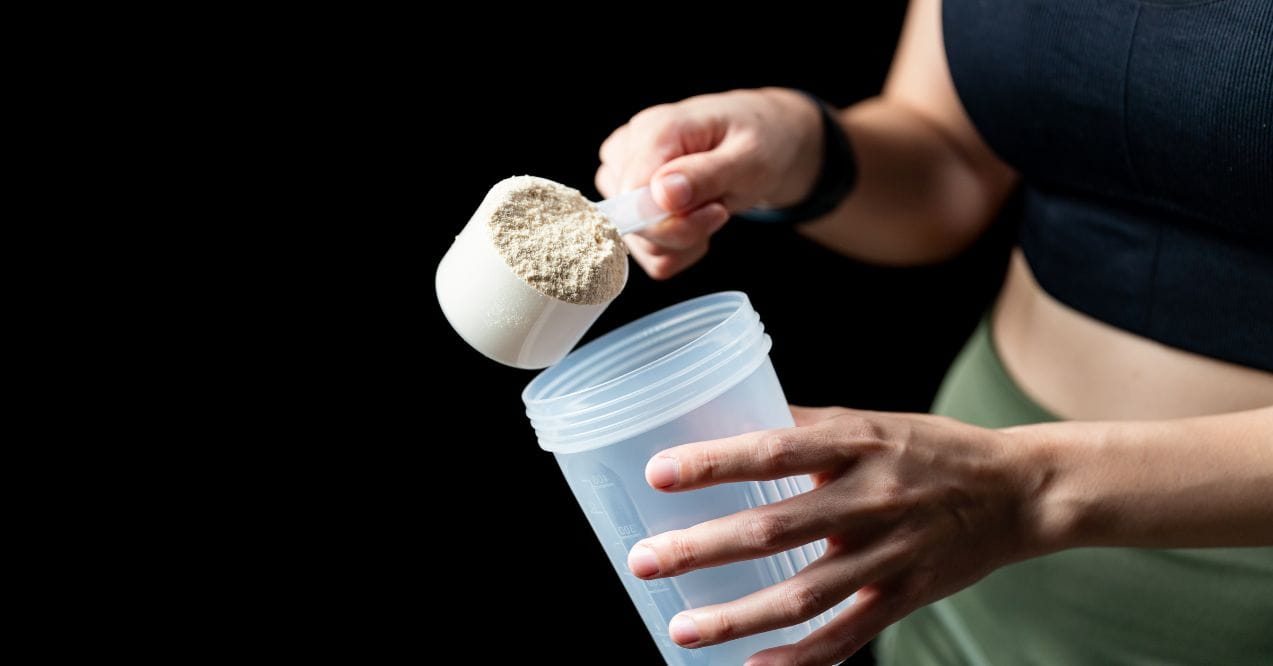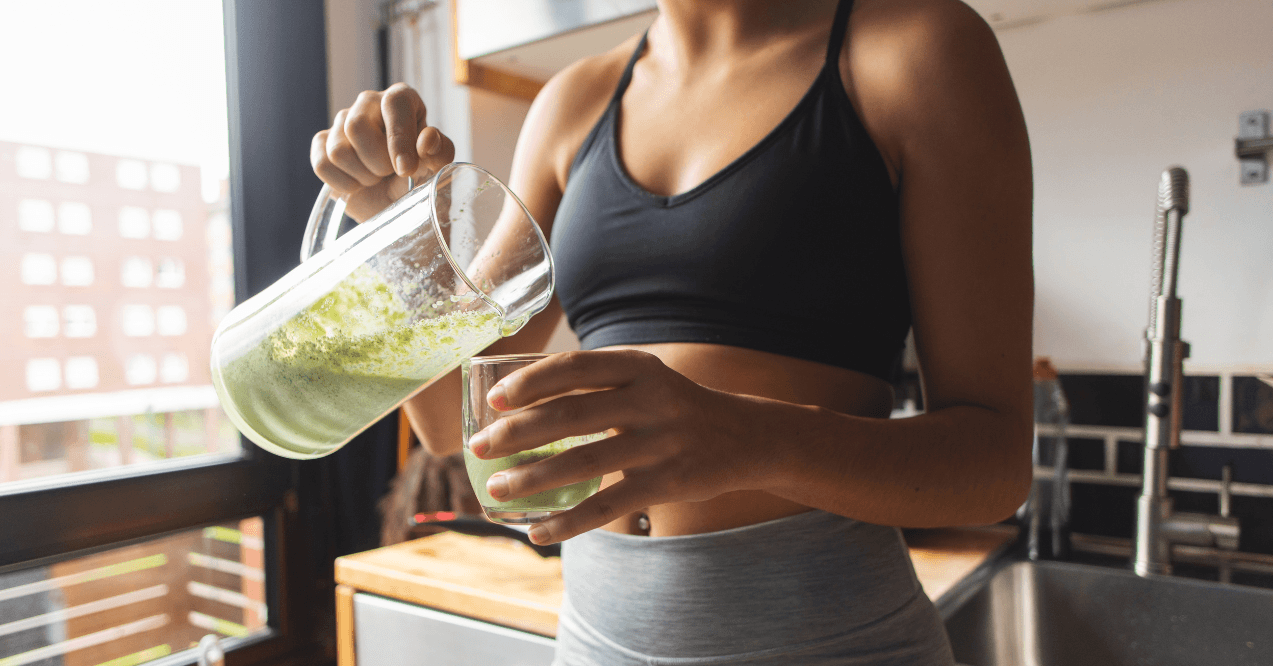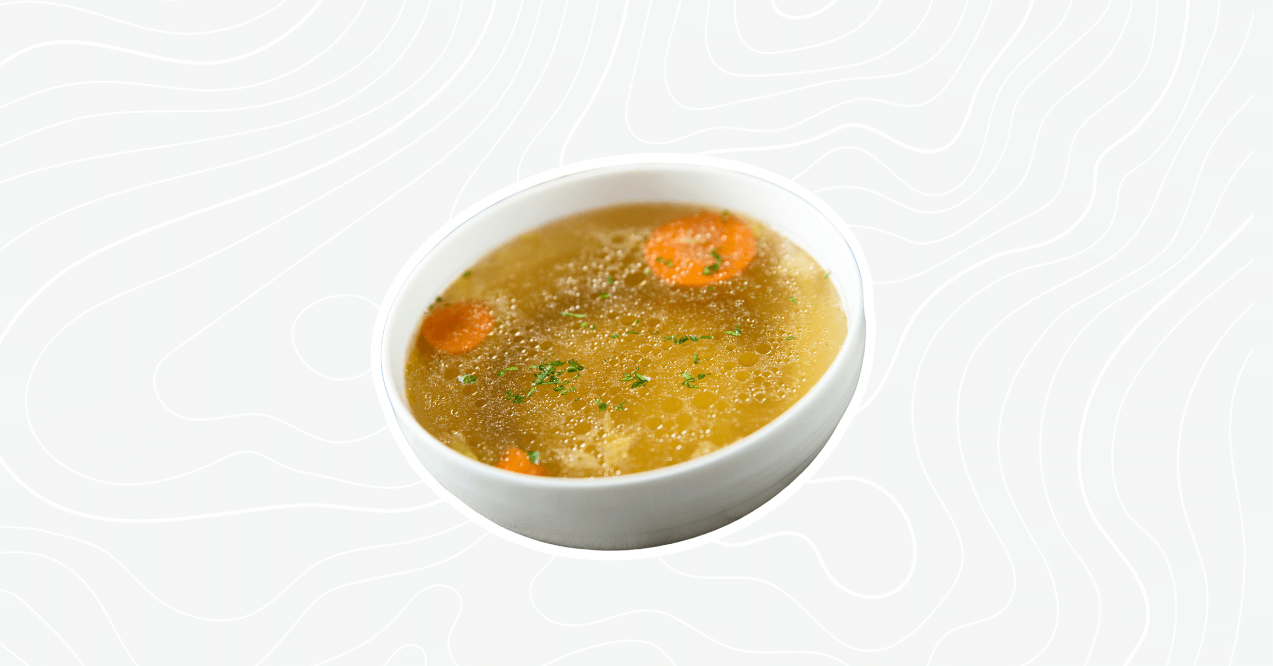Best Tea for Bloating: 7 Herbal Teas
If you’re searching for the best tea for bloating in an effort to ease the feeling of fullness, tightness, or swelling in your abdominal area, you’re not alone. Millions of people across the globe struggle with this gut issue at least once in their lifetime. But if you want to forget about it once and for all and improve your quality of life, you first need to understand what’s causing your bloating symptoms.
Bloating is a widespread digestive issue that can lead to discomfort and unease. It causes your abdomen to appear stretched and more prominent by generating excess gas in your gut. Several factors can contribute to bloating, including constipation, consumption of fizzy drinks, and certain food items like dairy products and grains. For instance, have you ever wondered, does coffee make you bloated? It’s a common question for those who rely on their morning brew but struggle with bloating afterward.
Understanding the full spectrum of causes, such as asking “can ovulation cause bloating?” alongside dietary and activity-related factors, enriches your approach to tackling this issue effectively. Although there’s no cure for bloating, there are several ways to manage the symptoms. For instance, drinking certain herbal teas can soothe your digestive system and control the bloating sensation. To further support your digestive health, consider incorporating superfood powders into your diet, as they can provide essential nutrients that promote a balanced gut environment.
The best tea for gut health is one that not only helps manage bloating but also supports the overall wellbeing of your digestive system. It’s worth trying out different tricks to keep your gut healthy and happy. After all, it influences the correct functioning of your body, acting as a second brain. Keep reading to learn which herbal teas are the best for dealing with bloating and their significance to your gut’s health.
Key Article Findings:
What Is Gut Detox?
Gut detoxification is a process that involves eliminating harmful substances and toxins from your digestive system. This helps improve digestion and maintain overall gut health. A high-fiber diet, hydration, and probiotics can all play a role in keeping your digestive system running smoothly.
However, certain dietary habits can sometimes contribute to digestive discomfort. For instance, Does Protein Powder Cause Constipation? Many people who use protein supplements notice changes in digestion, especially if their powder lacks fiber or contains additives that slow bowel movements. Just as bloating can stem from various food choices, being mindful of how supplements affect digestion is key to maintaining gut balance.
But is using herbal tea for bloating the only way to detoxify your gut? The short answer is no. In addition to consuming herbal teas, there are other helpful ways to cleanse your colon. For instance, you can try a saltwater flush, which involves drinking a mixture of warm water and non-iodized salt.
This concoction acts as a natural laxative and helps cleanse your colon by flushing out any waste and toxins within your gut (McDermott, 2023). However, the saltwater flush requires you to proceed with caution to avoid risking a sodium overload. Also, if you drink excess salty water on an empty stomach, you may experience vomiting and nausea.
A high-fiber diet consisting of fruits, vegetables, nuts, seeds, whole grains, and legumes is another excellent way to cleanse your gut and improve your health. Fiber will help regulate constipation and collect or bulk up any toxic matter remaining in your intestines as the digested food moves through your gut. As a result, it helps regulate your digestion, reduces the chances of constipation, and promotes the growth of good bacteria in the gut.
You can also help detox your digestive system by consuming probiotics regularly, which are good bacteria that boost the health of your gut. You can ingest these live microorganisms either through foods like yogurt or kefir or over-the-counter supplements. When you take probiotics, you can balance the gut microbiome, improve digestion, and strengthen your immune system, among other benefits.

Best Tea for Bloating
Herbal teas contain natural compounds that ease digestive discomfort and help you manage the symptoms of bloating with regular intake. Peppermint tea, for example, relaxes the muscles of your gastrointestinal tract, reducing gas and abdominal distension. Ginger tea calms inflammation and helps food move through your system smoothly. Chamomile tea, which is known for its anti-inflammatory properties, eases gut irritation. Fennel tea is another champion, relaxing the digestive muscles and reducing the stretchy feeling.
So, with all these options at hand, which is the best tea for bloating? We’re glad you asked. There are seven herbal infusions that we recommend if you struggle with bloating, stomach pain, and other signs of an unhealthy gut. If you’re looking for the best tea for stomach pain and bloating, enjoy the comforting effects of the options below as you decide which one works best for you.
1. Peppermint Tea

This herbal infusion is highly recommended for dealing with bloating and constipation. Although it is believed to have originated from Europe and the Middle East, there are records indicating that ancient Egyptians used peppermint tea as far back as 1000 BC. Believe it or not, scientists have discovered dried peppermint tea leaves in their ancient tombs.
Peppermint tea contains high amounts of menthol, which gives the tea its uniquely cool taste. This component, which is also a natural muscle relaxant, soothes your digestive tract, allowing gas to pass more easily. As a result, it reduces the spasms that can lead to that uncomfortable, puffed-up feeling in your belly.
Sipping on this fragrant elixir after a meal can help reduce bloating, leaving you feeling more comfortable and relaxed. Undoubtedly, taking peppermint tea for bloating is a tasty, caffeine-free way to support your digestion naturally.
2. Ginger Tea

Another great tea for bloating is ginger tea. In fact, ginger has a remarkable history in traditional medicine. The herb is believed to have originated from Maritime Southeast Asia. For over 5,000 years, several cultures, like the Chinese and Indians, have used ginger to ease symptoms of many ailments, including bloating. It’s also praised for its health benefits, like reducing nausea and acting as an antioxidant.
When it comes to alleviating bloating, all the magic lies in ginger’s natural compounds, like gingerol and shogaol. These elements relax and soothe your intestinal muscles, helping gas move through your digestive system more smoothly. Ginger’s anti-inflammatory properties also ease gut irritation, reducing that uncomfortable, distended feeling.
3. Green Tea
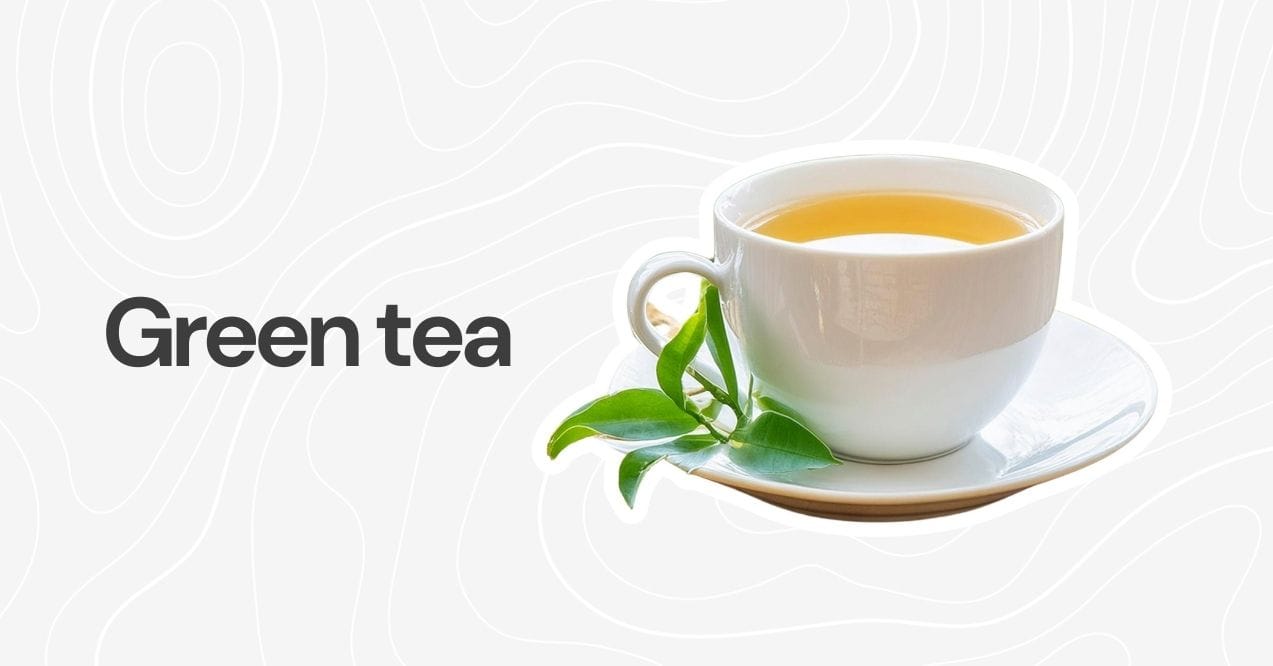
Is green tea good for bloating? Absolutely. Green tea can be a valuable tool in the fight against bloating. This is because it contains antioxidant compounds, such as catechins like EGCG (Epigallocatechin gallate), which can help prevent oxidative stress and inflammation in your digestive system (Ld, 2019).
EGCG, a superstar antioxidant, also aids in improving metabolism and fat digestion. It supports a healthy gut by promoting beneficial bacteria, which can further alleviate bloating. In addition to helping with digestion, drinking green tea also offers a refreshing way to remain hydrated. Last but not least, it contains caffeine and L-theanine, which can improve alertness, focus, and cognitive function.
4. Turmeric Tea
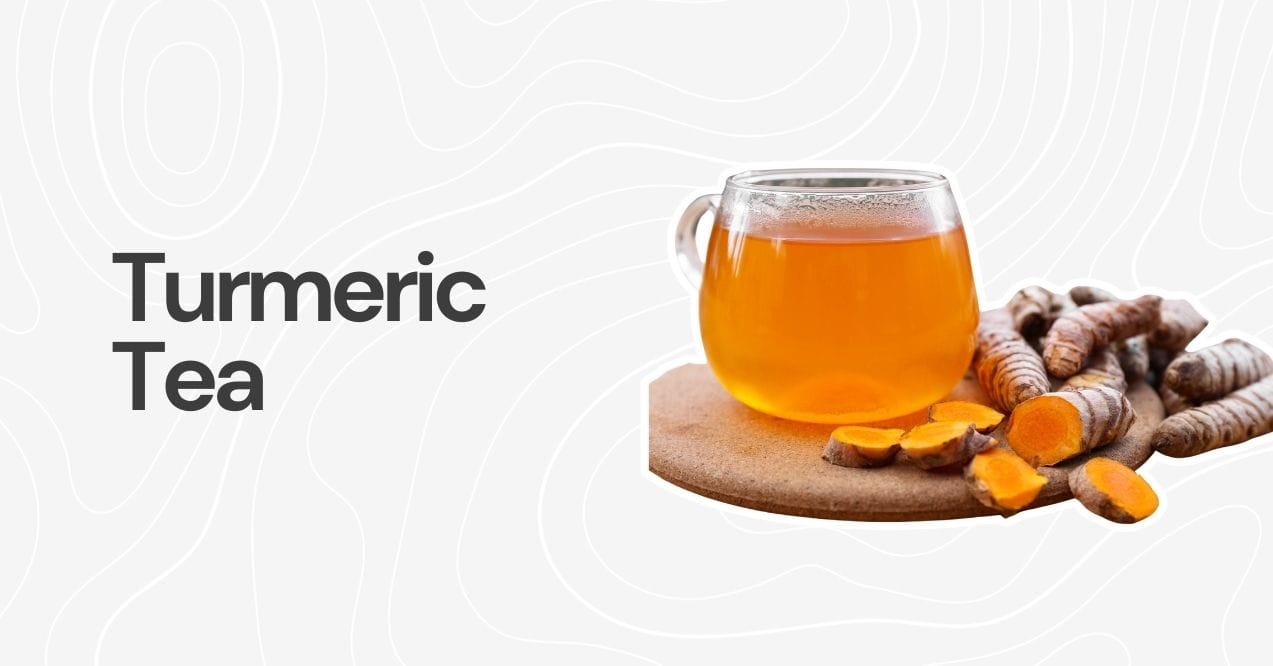
Many argue the best tea for bloating is turmeric tea. This increasingly popular cooking spice contains curcumin, an active compound that fights inflammation and calms your digestive system. This substance eases muscle spasms and reduces gas, leaving you feeling lighter and alleviating the bloating (Team, 2022).
The process of making a soothing cup of turmeric tea is quick and easy. All you need to do is follow the following steps:
- Step 1: Bring a cup of water to a boil.
- Step 2: Add a teaspoon of ground turmeric or simply cut a fresh turmeric slice.
- Step 3: Add a pinch of black pepper to help in turmeric absorption.
- Step 4: Simmer the tea for about 10 minutes, allowing its golden goodness to infuse
- Step 5: Lastly, strain the tea into your favorite mug, sweeten it to your liking, and sip slowly.
Experience the soothing warmth of turmeric while its anti-inflammatory and antioxidant properties work to heal your body. Drink this tea every morning before breakfast for improved results.
5. Fennel Tea
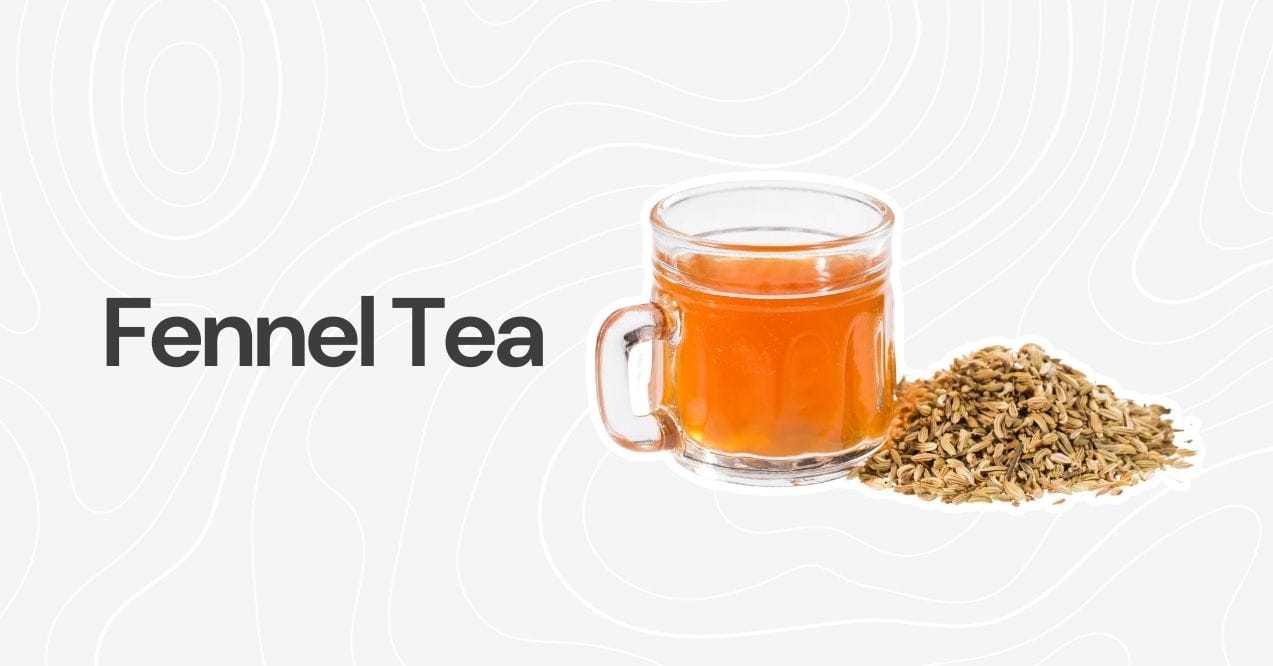
Because everybody is different, it’s hard to say for sure what the best tea for bloating is. However, fennel tea is among the top contenders. The fennel seeds contain compounds that relax your digestive muscles. This, in turn, reduces gases and bloating in your gut. You can easily prepare fennel tea at home any time you feel like your gut is acting up. All you have to do is follow these three simple steps:
- Step 1: Add a teaspoon of fennel seeds into a cup.
- Step 2: Gently pour the hot water over the fennel seeds and cover it for about 10-13 minutes to let it steep.
- Step 3: Carefully strain the tea to remove the seeds.
At this point, the tea is ready, so sit back and enjoy your aromatic and flavorful drink. Anytime you need relief from bloating, just sip your fennel tea and let it soothe your gut.
6. Chamomile Tea

Chamomile tea is known for its excellent digestive properties. Its natural compounds, such as bisabolol and chamazulene, possess anti-inflammatory and muscle-relaxing properties that can alleviate digestive spasms and inflammation, and help reduce bloating and discomfort.
Drinking this gentle elixir can be like a comforting hug for your tummy, providing relief from any discomfort. To enhance the tea’s flavor, you can add a touch of honey or lemon, although it tastes great on its own.
7. Lemon Tea
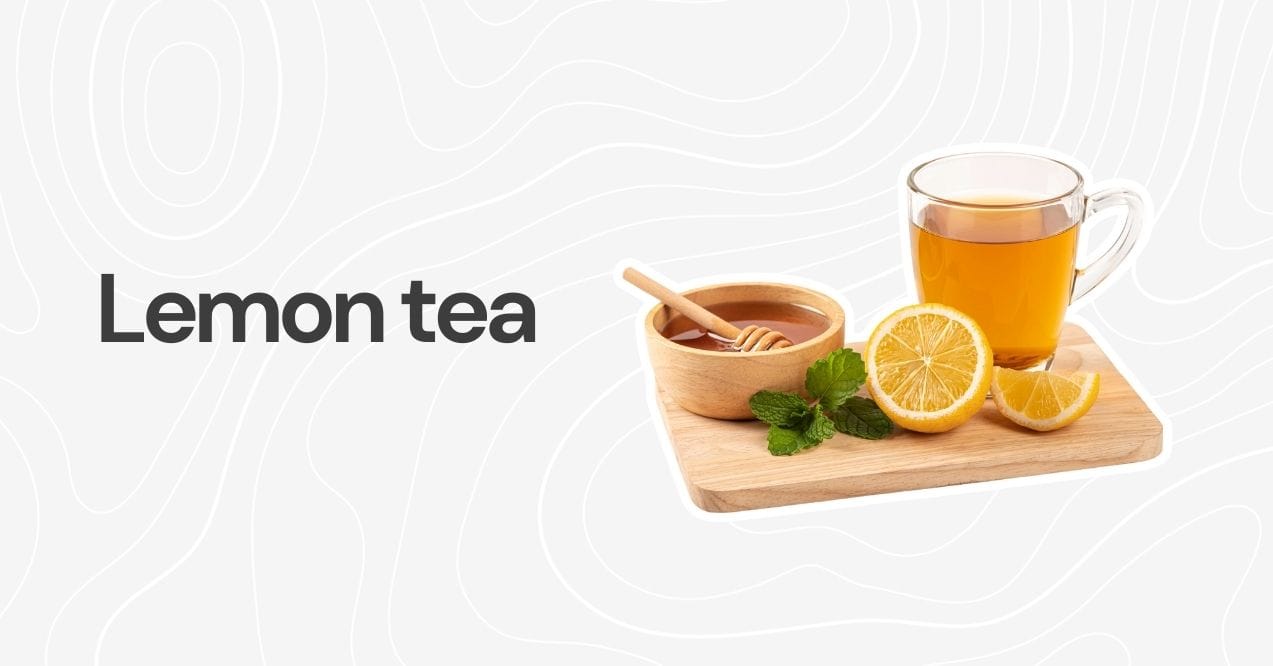
Another winner in the best tea for bloating category is lemon tea. Lemon juice has citric acid, which boosts the performance of your stomach’s digestive enzymes. Moreover, lemon tea combines the benefits of warm water with the fiber in the lemon pulp to aid in regulating your bowel movements and preventing constipation. In addition, it provides essential hydration to keep your digestive system functioning smoothly.
Anytime you feel bloated, just take some warm lemon tea to help relax your digestive tract muscles, and reduce the gas buildup and bloating. You can sip on a cup of warm lemon tea in the morning or after meals, and you’ll feel the citrusy goodness working its charm.
How to Prepare Tea for Bloating?
Now that you know what tea is good for bloating, you need to prepare one perfectly. To maximize the benefits of tea and fight uncomfortable symptoms, it’s important to prepare it carefully. Here’s your guide to brew a soothing cup of tea.
- Step 1: Choose the Right Tea
Select a tea known for its digestive benefits, like peppermint, ginger, fennel, chamomile, or a blend designed explicitly for digestion. As we mentioned earlier, each tea has unique properties to ease bloating.
- Step 2: Use Fresh Ingredients
For maximum benefits, ensure that you use fresh ingredients whenever possible. Fresh ginger, fennel seeds, or whole chamomile flowers will pack a more potent punch than stale ones.
- Step 3: Observe the Correct Steeping Time
Steeping time varies by the type of tea. Typically, 5-10 minutes is sufficient, but ensure you follow the instructions on the package for best results.
- Step 4: Cover While Steeping
Make sure you keep the tea covered while steeping. This will help to trap the essential oils and flavors, ensuring a more effective infusion while brewing the tea.
- Step 5: Don’t Overdo It!
Remember that anything done in excess can have adverse effects on your body. So, stick to the recommended measurements to avoid overpowering flavors or potential side effects. By following these steps, you’ll maximize your bloat-fighting tea’s effectiveness.
Try Out Probiotics from Trumeta
So, can you combine herbal teas with probiotics to boost your gut health? Absolutely. When you combine probiotics with herbal teas, it’s a match made in gut heaven. The teas provide relief from bloating and digestive discomfort, while probiotics alleviate bloating and support long-term gut health. The result? A happy, balanced digestive system with fewer bloating occurrences.
Are you looking for an organic supplement designed to support overall health and alleviate bloating? Then look no further because trumeta metabolic greens will get the job done. It is a powdered blend of nutrient-rich organic superfoods, probiotics, and metabolic enzymes, all carefully selected to target digestive health and optimize metabolism. Its ingredients include:
- Green Superfoods: These organic nutrients are rich in vitamins, minerals, and antioxidants, which will improve your gut health and minimize feelings of discomfort in your gut.
- Probiotics: Strains like Bacillus coagulans aid in decreasing constipation, diarrhea, gas, bloating, and stomach cramps. Bacillus subtilis, on the other hand, aids in promoting a healthy gut lining and preventing leaky gut syndrome.
- Metabolic Blend: Metabolic compounds, like organic goji, enhance the metabolism of glucose energy. The organic acai provides your gut with a rich source of fats. These compounds can break down food and make it easier for your body to absorb nutrients.
The Trumeta Metabolic Greens supplement is your secret ally in fighting against bloating. Feel free to check out our Trumeta Metabolic Reds supplement as well, which is also effective in helping your gut do its job.

Conclusion
Now you know the secret to improving your gut health and alleviating bloat at home. You can opt to do a saltwater flush, take a high-fiber diet, or take probiotics to detoxify your gut. If you prefer herbal teas, then you’re spoilt for choice because all the teas listed above will help with bloating in the following ways:
- Peppermint Tea: Soothes your digestive tract and allows gas to pass more easily.
- Ginger Tea: Relaxes and soothes your intestinal muscles and eases gut irritation.
- Turmeric Tea: Fights inflammation and calms your digestive system.
- Fennel Tea: Relaxes the digestive muscles, thereby reducing gas and bloating.
- Chamomile Tea: Eases your digestive spasms, reduces inflammation, and helps gas pass smoothly.
- Lemon Tea: Aids in regulating your bowel movements, preventing constipation, and reducing the buildup of gas.
So, which is the best tea for bloating? Try them all and see the results for yourself!
Wondering what else can make you bloated? Read our article called ”Does creatine make you bloated?” and find out about the effects of creatine!
Gut detox refers to cleansing your gut system to reduce the amount of toxins. It’s linked to bloating because when your gut is overwhelmed with toxins or inflammation, it leads to digestive issues like gas, discomfort, and bloating. A detox method like taking herbal tea for bloating can help to improve gut health
If we had to choose what tea is good for bloating from the list above, then we’d go for ginger tea. It’s been around for thousands of years, and on top of reducing bloating, it soothes your intestinal muscles and eases gut irritation. All the other herbal teas are great, too.
Yes. Trumeta Metabolic Greens supplement is excellent at reducing bloating, renewing your energy, and boosting your metabolism. Plus, the supplement nourishes your body with additional nutrients that you may lack in your daily diet. Metabolic Greens has potent ingredients that not only support a healthier gut but also promote smooth skin.
Advertisement. This site offers health, wellness, fitness and nutritional information and is designed for educational purposes only. You should not rely on this information as a substitute for, nor does it replace, professional medical advice, diagnosis, or treatment. If you have any concerns or questions about your health, you should always consult with a physician or other health-care professional. Do not disregard, avoid or delay obtaining medical or health related advice from your health-care professional because of something you may have read on this site. The use of any information provided on this site is solely at your own risk.
